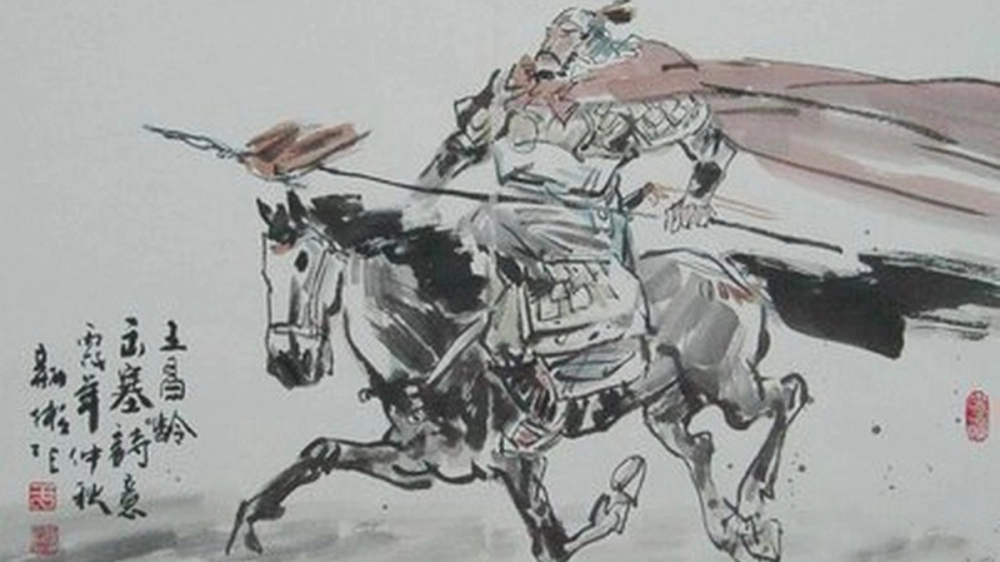古从军行[1]
白日登山望烽火,
黄昏饮马傍交河[2]。
行人刁斗风沙暗[3],
公主琵琶[4]幽怨多。
野营[5]万里无城郭,
雨雪纷纷连大漠。
胡雁哀鸣夜夜飞,
胡儿[6]眼泪双双落。
闻道玉门犹被遮[7],
应将性命逐轻车[8]。
年年战骨埋荒外[9],
空见葡萄入汉家。
注释:
[1] 古从军行:从军行乃乐府旧题,这首诗是拟古,所以称“古从军行”。
[2] 交河:在今新疆维吾尔自治区西北部的吐鲁番县。
[3] “行人”句:行人,行军之人。刁斗,古代军队用的铜器,白天作锅,夜晚用采打更。
[4] 公主琵琶:相传汉武帝时以江都王刘建女细君嫁乌孙国王昆莫,恐其途中烦闷,故弹琵琶以娱之。这句用此典故,写征途中听到的幽怨的琵琶声。
[5] 野营:一作“野云”。
[6] 胡儿:少数民族人民。
[7] “闻道”句:遮,阻拦。据《汉书·李广利传》,汉武帝曾命李广利攻大宛,欲至贰师城取良马,战不利,广利上书请撤兵回国,武帝大怒,发使遮玉门关。曰:“军有敢入,斩之!”
[8] “应将”句:逐,跟随。轻车,车将军的简称,这里指将帅。
[9] 荒外:极边远的地方。
Army Life
Li Qi
We climb up mountains to watch for beacon fires,
And water horses by riverside when day expires.
We beat the gong in sand-darkened land where wind blows,
And hear the pipa tell the princess’ secret woe.
There is no town for miles and miles but tents in rows;
Beyond the desert there’s nothing but rain and snow.
The wild geese honk from night to night, that’s all we hear;
We see but Tartar soldiers shedding tear on tear.
’Tis said we cannot go back through the Jade Gate Pass;
We’d risk our lives to follow war-chariots, alas!
The dead are buried in the desert year by year,
Only to bring back grapes from over the frontier.
The poet draws a desolate picture of the army life on the frontier.
《古从军行》是唐代诗人李颀的作品。此诗讽刺当时唐玄宗的开边,充满反战思想。开首先写紧张的从军生活:白日黄昏繁忙,夜里刁斗悲呛,琵琶幽怨,景象肃穆凄凉。接着渲染边陲的环境:军营所在,四顾荒野,大雪荒漠,夜雁悲鸣,一片凄冷酷寒景象。最后写如此恶劣环境,本应班师回朝,然而皇上不准;而千军万马拼死作战的结果,却只换得葡萄种子归国,足见君王之草菅人命。全诗句句蓄意,步步逼紧,最后才画龙点睛,着落主题,显出其讽刺笔力。
This poem is a work by Li Yi, a poet of the Tang Dynasty. The poem is a satire on the opening of the border by the Tang Emperor Xuanzong, full of anti-war thoughts. The poem begins with a description of the intense military life: the daytime is busy at dusk, the night is sad with diao dou, the pipa is sorrowful, and the scene is solemn and desolate. Then, the environment of the frontier is rendered: the military camp is located, the wilderness is looked around, the snowy desert, the night geese are sadly singing, a cold and miserable scene. In the end, the poem is about the harsh environment and the fact that the emperor forbade the return of the troops to the imperial court, and that only grape seeds were returned to the country in exchange for the death of thousands of soldiers and horses. The whole poem is deliberate, and the poem is tightened up step by step, and only at the end does the poem focus on the theme, showing its ironic writing power.







